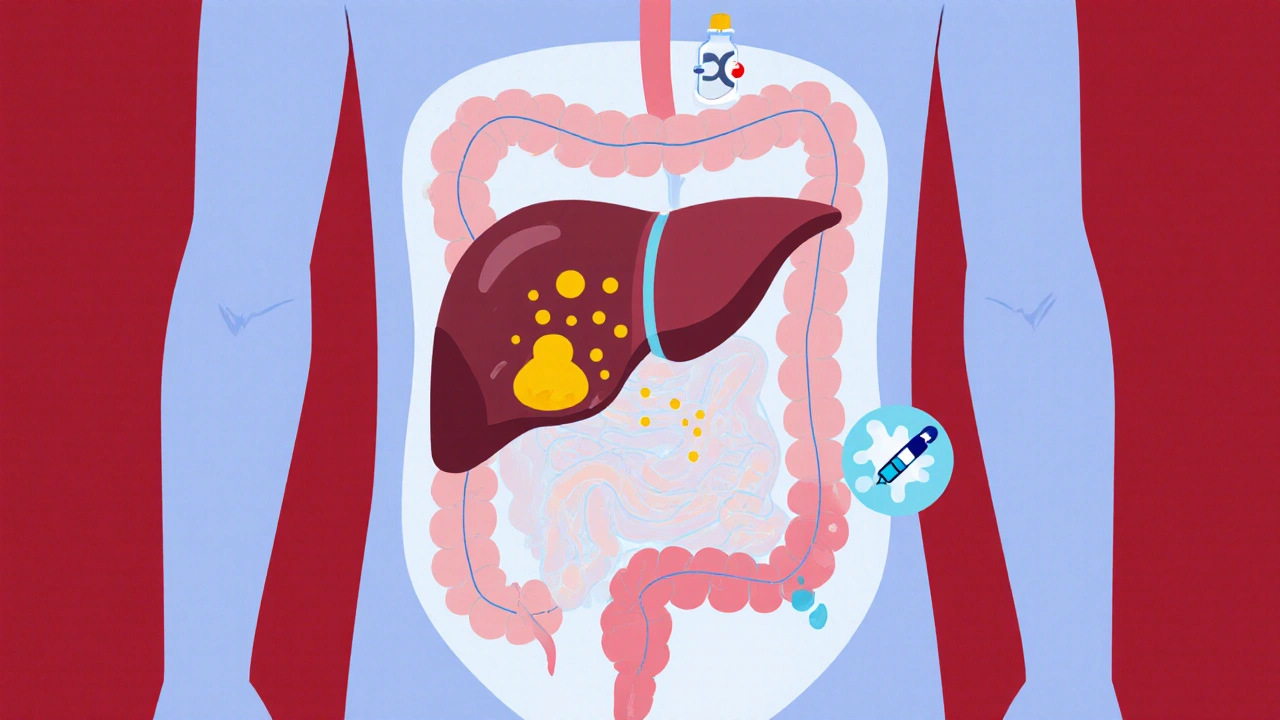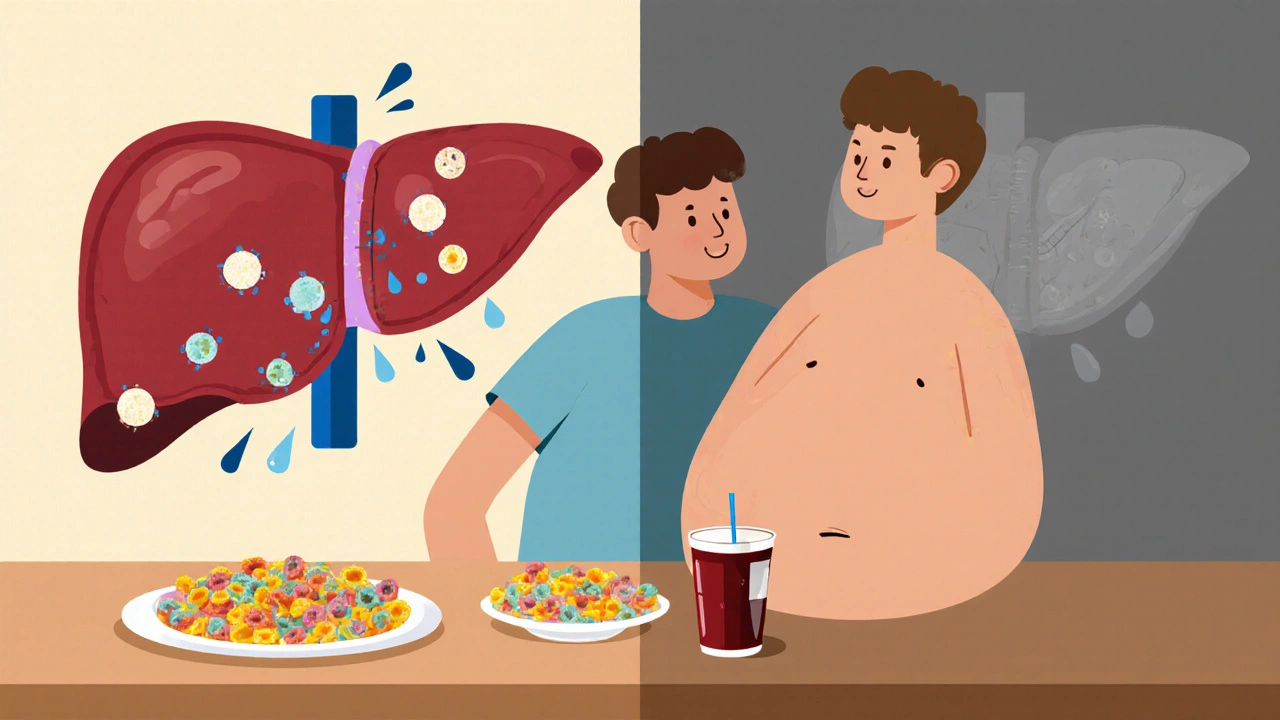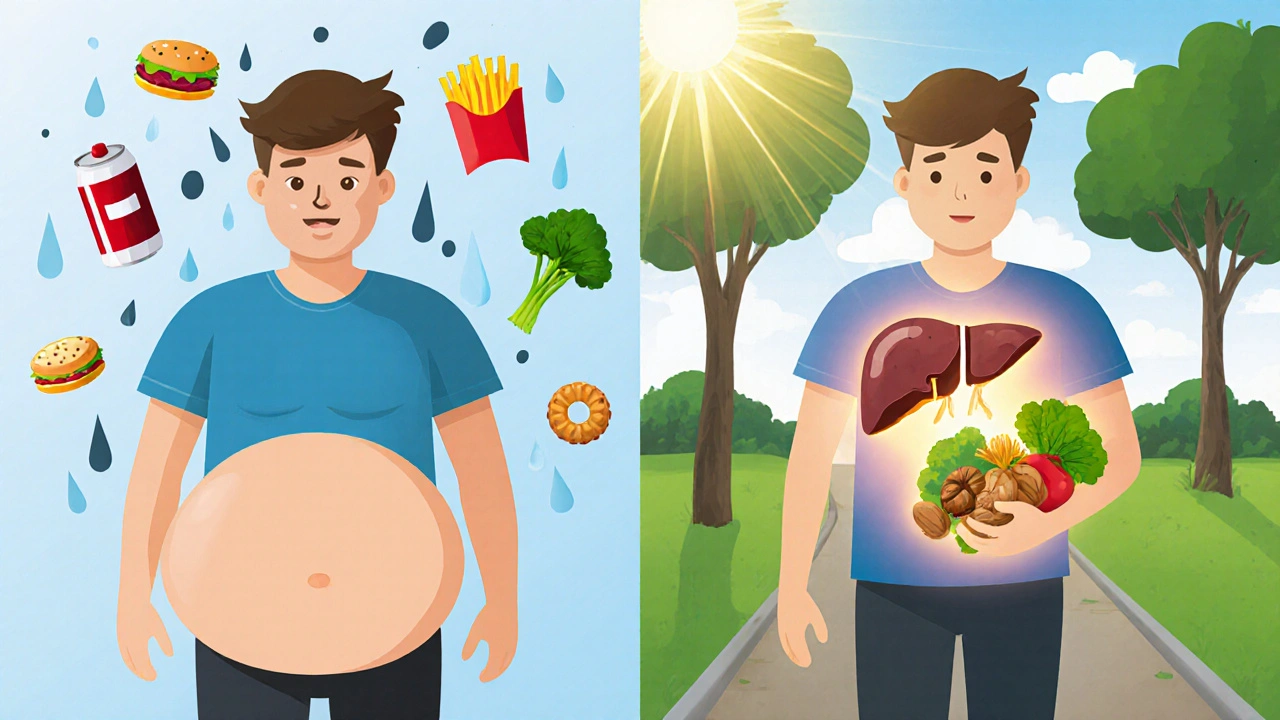
If you’re constantly feeling bloated, like your belly is swollen after eating even a small meal, and you’ve been told you have fatty liver disease, you’re not imagining it. There’s a real connection between the two - and ignoring it could make things worse. Abdominal distension isn’t just discomfort; it’s your body signaling something’s off with how your liver is handling fat, fluid, and digestion.
What Exactly Is Fatty Liver Disease?
Fatty liver disease happens when too much fat builds up in liver cells. It’s not caused by drinking alcohol - that’s a different condition. This one, called non-alcoholic fatty liver disease (NAFLD), affects about 1 in 3 adults in the UK. It starts simple: a little extra fat in the liver. But over time, that fat can trigger inflammation, scarring, and even liver damage. The scary part? Most people don’t feel anything until it’s advanced.
The liver doesn’t have pain receptors, so you won’t get a sharp ache. Instead, you’ll notice subtle signs: fatigue, weakness, or that persistent feeling of fullness in your upper right side. And yes - bloating. When your liver can’t process fats or insulin properly, it messes with digestion, slows gut motility, and causes fluid to build up. That’s where the distension comes in.
How Fatty Liver Causes Bloating and Distension
Your liver isn’t just a filter - it’s a factory. It makes bile to break down fats, regulates blood sugar, and helps clear toxins. When it’s clogged with fat, all these jobs slow down.
- Bile production drops → fats aren’t broken down well → undigested fat sits in your gut → gas and bloating follow.
- Insulin resistance grows → your body stores more fat, including around your organs → abdominal fat pushes outward, making your belly look and feel swollen.
- Fluid leaks → when liver function declines, proteins like albumin drop → fluid escapes into the belly cavity (ascites) → your abdomen swells noticeably, even when you haven’t eaten.
A 2024 study in the Journal of Hepatology found that 68% of people with moderate to severe NAFLD reported chronic abdominal distension - more than those with mild cases. The worse the liver fat, the more likely bloating becomes. It’s not just coincidence. It’s physiology.
What Does Abdominal Distension from Fatty Liver Feel Like?
It’s not the same as eating too much pizza. This bloating is different:
- It doesn’t go away after burping or passing gas.
- Your belly feels tight, hard, or heavy - not just puffy.
- You might notice it gets worse in the evening, even if you ate lightly.
- You may feel full after just a few bites - your stomach feels like it’s already full.
- There’s no relief from antacids or laxatives.
Some people also report a dull ache under the ribs on the right side. That’s your liver stretched thin by fat. If you’re seeing visible swelling - your belly sticks out more than usual, your clothes feel tighter, or your waistline has grown without weight gain - that’s a red flag. It could be ascites, which means your liver is struggling to manage fluid balance.

Other Conditions That Mimic Fatty Liver Bloating
Not every bloated belly means fatty liver. Other issues can look the same:
- Small intestinal bacterial overgrowth (SIBO) - causes gas, bloating, diarrhea. Often overlaps with fatty liver.
- Polycystic ovary syndrome (PCOS) - linked to insulin resistance and belly fat buildup.
- Celiac disease - gluten intolerance can cause bloating and liver enzyme spikes.
- Chronic constipation - backed-up stool pushes on the abdomen.
The key is pattern. If you’ve been diagnosed with fatty liver and you’re bloated - especially if you also have high triglycerides, elevated liver enzymes (ALT, AST), or type 2 diabetes - the link is likely real. A doctor can rule out other causes with blood tests, ultrasound, or a FibroScan.
How to Reduce Bloating When You Have Fatty Liver
Fixing the bloating means fixing the liver. It’s not about more laxatives or probiotics - though those can help a bit. The real solution is lifestyle.
- Cut added sugar - especially fructose. Soda, candy, sweetened yogurts, and even fruit juices spike liver fat. One 12-oz soda a day can double your liver fat in 8 weeks.
- Choose healthy fats - olive oil, avocado, nuts, and fatty fish (salmon, mackerel) help reduce inflammation. Avoid fried foods and processed snacks.
- Move daily - 30 minutes of walking five days a week cuts liver fat by 20% in 12 weeks, even without weight loss.
- Don’t skip meals - irregular eating worsens insulin resistance. Eat at consistent times, even if you’re not hungry.
- Limit alcohol - even one drink a day can make fatty liver worse. No safe level exists if your liver is already stressed.
Some people find relief with magnesium supplements or gentle movement like yoga, which helps stimulate digestion. But don’t rely on supplements alone. The real change comes from food and movement.
When to See a Doctor
You don’t need to panic over every bit of bloating. But if you notice:
- Your belly swells noticeably over days or weeks
- You gain weight quickly without eating more
- Your legs or ankles swell too
- You feel unusually tired, nauseous, or confused
- Your skin or eyes turn yellow
That’s urgent. These are signs of advanced liver damage. A simple ultrasound can show how much fat is in your liver. Blood tests check liver enzymes and kidney function. If ascites is present, your doctor might drain fluid and test it to rule out infection.
Don’t wait until you’re in pain. Fatty liver is reversible - especially in its early stages. The sooner you act, the better your chances of reversing the damage and eliminating the bloating.

What to Eat: A Simple Daily Plan
You don’t need a complicated diet. Here’s what works for most people with fatty liver and bloating:
- Breakfast: Oats with chia seeds, a handful of blueberries, and a boiled egg.
- Lunch: Grilled chicken or lentils, big salad with olive oil and vinegar, half a sweet potato.
- Dinner: Baked salmon, steamed broccoli, quinoa.
- Snacks: Raw almonds, plain Greek yogurt, carrot sticks with hummus.
- Drinks: Water, herbal tea (dandelion, peppermint), sparkling water with lemon.
Avoid: white bread, pastries, sugary cereals, processed meats, and anything with high-fructose corn syrup.
Can Fatty Liver and Bloating Be Reversed?
Yes - and fast. In one study, people who lost 5-7% of their body weight saw a 30% reduction in liver fat within 6 months. For someone weighing 90kg, that’s just 4.5-6.3kg. That’s less than a suitcase of groceries.
When liver fat drops, bile flow improves, insulin sensitivity gets better, and fluid retention decreases. The bloating fades. People report feeling lighter, more energetic, and finally able to fit into clothes they’d put away.
It’s not magic. It’s science. Your liver is one of the most resilient organs in your body. Give it the right fuel, and it will heal.
Can fatty liver cause bloating even if I’m not overweight?
Yes. You don’t need to be overweight to have fatty liver. People with normal weight but high sugar intake, sedentary lifestyles, or insulin resistance can develop it. This is called "lean NAFLD." Bloating happens because the liver can’t process fats and toxins properly - not because of body size.
Will losing weight help my bloating if I have fatty liver?
Absolutely. Losing even 5% of your body weight reduces liver fat and improves digestion. As your liver heals, bile production improves, gut motility speeds up, and fluid buildup decreases. Many people notice their bloating starts to fade within 4-8 weeks of starting a healthy diet and walking daily.
Is bloating from fatty liver the same as IBS?
No. IBS bloating comes and goes with stress or certain foods like beans or dairy. Fatty liver bloating is persistent, often worse in the evening, and doesn’t respond to typical IBS treatments. It’s tied to liver function, not gut sensitivity. If you’ve been treated for IBS and nothing works, check your liver health.
Can medications cause bloating with fatty liver?
Some can. Medications like metformin, statins, or certain diabetes drugs can cause mild bloating as a side effect. But they’re usually not the main cause. If you’re on medication and notice bloating started after beginning a new drug, talk to your doctor - but don’t stop taking it. The bigger issue is still the fatty liver itself.
How long does it take to see less bloating after changing my diet?
Most people notice improvement in 2-4 weeks. Cutting sugar and processed foods reduces inflammation fast. Within 6-8 weeks, liver enzymes often drop, and bloating becomes less frequent and less severe. Consistency matters more than perfection. Even small changes add up.
What Comes Next?
Start today. Write down what you eat for three days. Look for hidden sugar - in sauces, yogurts, bread, even "healthy" granola. Swap one sugary drink for water. Take a 20-minute walk after dinner. That’s it. No need for drastic changes.
Your liver doesn’t need a miracle. It needs consistency. And the bloating? It’s not just an annoyance - it’s your body’s way of saying, "Help me heal." Listen. Act. The relief is closer than you think.




Dave Pritchard
November 18, 2025 AT 21:23Been dealing with this for years. Started cutting out soda and processed snacks last year - didn’t even realize how much sugar was hiding in "healthy" granola bars. Bloating didn’t vanish overnight, but after 6 weeks, I could actually button my jeans again. Your liver’s not broken, it’s just overworked. Give it a break, and it’ll thank you.
kim pu
November 20, 2025 AT 01:50lol so now liver fat is the new boogeyman? Next they’ll say my WiFi router is giving me ascites. I’ve been bloated since college and I eat kale and quinoa like it’s my job. Maybe it’s just my damn gut? Or maybe you’re selling a detox tea? 🤔
malik recoba
November 20, 2025 AT 22:26i read this and thought ‘this is me’... i’m not overweight but i’ve been tired all the time and my belly just feels heavy. i didn’t know it could be my liver. i’m gonna start walking after dinner and ditch the soda. thanks for writing this, it made sense.
Sarbjit Singh
November 22, 2025 AT 18:50Bro, this is life-changing 💯
My uncle had fatty liver and he lost 15kg in 5 months just by walking and drinking water with lemon. No magic, just consistency. You got this! 🙌
Angela J
November 23, 2025 AT 22:57Did you know Big Pharma doesn’t want you to know this? They make billions selling statins and metformin - but if you just cut sugar and walk, they lose. That’s why your doctor never mentions this. The liver can heal itself - but only if you ignore the pills and listen to your body. Wake up.
Sameer Tawde
November 25, 2025 AT 21:39Small steps. One day at a time.
Swap soda for sparkling water.
Walk after dinner.
That’s it.
You don’t need a detox.
You need consistency.
Erica Lundy
November 26, 2025 AT 05:10The phenomenological experience of abdominal distension, when contextualized within the biosemiotic framework of hepatic metabolic dysregulation, reveals a profound rupture in the organism’s homeostatic equilibrium. One is compelled to interrogate whether the modern diet, as a technocratic artifact of industrialized alimentation, has fundamentally reconfigured the liver’s epistemic role in human physiology - transforming it from a metabolic organ into a silent witness to systemic neglect. The bloating, then, is not merely a symptom, but a semiotic utterance of the body’s existential plea for recalibration.
Hannah Blower
November 28, 2025 AT 01:04Wow, another ‘eat less sugar’ article from someone who clearly thinks nutrition is a moral virtue. Congrats, you’ve discovered that processed food is bad. Did you also find out that breathing oxygen is good for you? Meanwhile, real people have metabolic disorders, thyroid issues, and gut dysbiosis - not just ‘bad habits.’ This post is dangerously reductive. Stop pretending liver fat is a character flaw.
Gregory Gonzalez
November 28, 2025 AT 23:10Of course the liver causes bloating. Next you’ll tell me the pancreas is responsible for cravings. How quaint. I’m sure your oatmeal and walk after dinner will fix everything. Meanwhile, I’ll be over here with my 30% liver fat, sipping my protein shake and ignoring your advice because I’m not a 50-year-old suburbanite trying to guilt-trip themselves into wellness.
Ronald Stenger
November 29, 2025 AT 07:26Let me guess - this is why America’s getting weak. We got soft. No one lifts weights anymore, everyone’s eating ‘healthy’ carbs, and now the liver’s the villain? Back in my day, we ate bacon, fried chicken, and worked hard. We didn’t whine about bloating. We just kept going. This is what happens when you let doctors and influencers run your life.
Duncan Prowel
November 29, 2025 AT 19:01While the correlation between NAFLD and abdominal distension is well-documented, one must consider the confounding influence of dietary fiber intake, circadian rhythm disruption, and gut microbiome composition. The referenced 2024 study, while robust, employs a cross-sectional design - thus precluding causal inference. A longitudinal cohort with controlled caloric intake would yield more definitive conclusions. That said, the practical advice remains sound.
Bruce Bain
November 30, 2025 AT 22:51I’m from India. We have this thing called ‘ghee’ - clarified butter. Used to be part of every meal. Then we started eating processed stuff. My dad had belly swelling. We switched back to home-cooked food, no sugar, no oil in cooking. He’s fine now. Simple stuff works. No need for fancy diets.
Jonathan Gabriel
December 2, 2025 AT 01:19So let me get this straight - if I stop eating sugar, my liver magically turns into a superhero? And if I walk 30 minutes, the ascites just… evaporates? Cool. I’ll try it. Meanwhile, I’ll keep my 100% organic, gluten-free, keto, paleo, plant-based, low-FODMAP, non-GMO, fair-trade, ethically sourced, cold-pressed, hand-harvested, artisanal kombucha that’s probably full of fructose anyway. 🤷♂️
Don Angel
December 2, 2025 AT 21:51I’ve been doing the walking and the water thing… and honestly? It’s working. I didn’t think it would. I thought I needed pills or surgery. But just… moving more and eating less junk? It’s been 3 weeks. My belly feels lighter. Not gone, but better. Thank you for not making this complicated.
deepak kumar
December 3, 2025 AT 21:48My sister had lean NAFLD - normal weight, but ate fruit juice and white rice every day. She started eating brown rice, lentils, and walking after dinner. In 2 months, her liver enzymes went from 120 to 40. No meds. Just food. Real food. You don’t need to be fat to have a fatty liver. You just need to be careless with sugar.